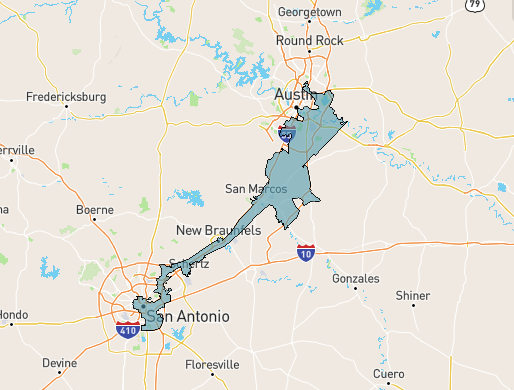One more federal redistricting lawsuit to add to the pile.
Texas State Rep. Trey Martinez Fischer filed a lawsuit today challenging boundaries of the recently redrawn U.S. House District 35.
In the lawsuit, Fischer claims that the redrawn map violates Section 2 of the Voting Rights Act and that is discriminates against Latino voters.
“Redistricting is a political process, but it impacts the people who live in our community personally. Our representation in Congress determines not only the resources we receive, but also how quickly our needs are addressed and how they are prioritized,” Fischer said. “By denying Latinos in CD-35 the opportunity to elect a candidate of their choice, Texas has shortchanged our community of the representation it deserves and has willfully committed a Section 2 violation.
Congressional District 35 spans the I-35 corridor from Austin to San Antonio. The redrawn maps were approved by Governor Greg Abbott on October 25.
“The nature of redistricting is creating winners and losers. District lines change, incumbents gain new constituents, and communities are divided. This is inevitable. What should not be inevitable is the intentional discrimination against Latino, Black, and AAPI voters that we have come to expect from Texas Republicans in redistricting. That is why I am challenging the state of Texas over the loss of a Latino opportunity district in Texas Congressional District 35, in direct violation of Section 2 of the 1965 Voting Rights Act.
A copy of the lawsuit is here. It is focused entirely on CD35, with the main thrust being that this district went from one that was majority Latino and had more population in Bexar County to one that is not majority Latino and has more population in Travis County. The complaint is fairly straightforward and not too long, so go read it.
As noted by Democracy Docket, this lawsuit has been combined with the others, including the Justice Department lawsuit filed earlier this month. While TMF originally asked for there to be “a permanent injunction prohibiting Defendants implementing any future elections held pursuant to SB 6”, the combined plaintiffs have since agreed (with one exception) to not ask for preliminary injunctions that would prevent the 2022 primaries for taking place, per the Brennan Center. Per Michael Li, the plaintiffs are asking for an October 2022 trial date, with the state of Texas asking for November. The exception are the plaintiffs in the Sen. Powell lawsuit over SD10 (known as the “Brooks plaintiffs”, as the first person listed is Roy Charles Brooks), who are asking for a preliminary injunction that would at least delay the 2022 primaries, since Sen. Powell will almost certainly be voted out next year under the current lines. I think that covers everything for now. Texas Public Radio has more.


NA SOWAS [Teutonic whataboutism]
So what about the Latino-German Texans? You know, the Martinez-Fischer-Fritzes von San Antone & Hill Country and sundry geneto-ethnic amalgams.
Do they have a salamander-district title-something claim too?
More on trans-ethnic miscegenation here: https://www.tshaonline.org/handbook/entries/germans
“Intermarriage has blurred ethnic lines, but the 1990 United States census revealed that 1,175,888 Texans claimed pure and 1,775,838 partial German ancestry, for a total of 2,951,726, or 17½ percent of the total population. By this count, Germans rank behind Hispanics and form the third-largest national-origin group in the state. Most persons of German descent do not regard themselves as ethnic Germans, however. From their first immigration to Texas in the 1830s, the Germans tended to cluster in ethnic enclaves. A majority settled in a broad, fragmented belt across the south central part of the state. This belt stretched from Galveston and Houston on the east to Kerrville, Mason, and Hondo in the west; from the fertile, humid Coastal Plain to the semiarid Hill Country. This German Belt included most of the Teutonic settlements in the state, both rural and urban.”
Pingback: Texas blog roundup for the week of December 27 – Off the Kuff